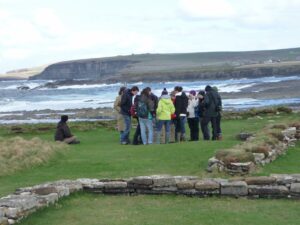
One of the nice things about being an academic is that you are part of a community. Whatever your interest, even if you spark a new one or wonder about a new research area, there will always be people who have worked on that particular thing in the past who can point you to information and help to discuss and develop your ideas. It is all about communication and contact.
Just occasionally you meet someone who thinks they are above all that. It does not usually end well…
It has happened a couple of times here in Orkney in the last couple of years. It is a big shame because it can lead to precious research money being wasted when the information gained and lessons learned from previous research are ignored. Sometimes the duplication of fieldwork is a good thing, sometimes it is just a waste of time. Research funding is a precious commodity these days and we all have a duty to make the most of it. In general, the incorporation of pre-existing understanding will only strengthen a piece of research.
Inadequate understanding of the existing research base can also lead to ‘false news’ leaking out into the media. Regular readers will know that this is one of my bugbears. I do find it difficult when someone does not let the facts get in the way of a good story. On occasion I have heard people blaming the media afterwards – but the media are just doing their job. They can only work from the material we give them. As academics we have a duty to make sure that when we publish something it is as accurate as possible. Misinformation tends to come back to haunt us.
It is more than that, however. When we send false news spinning out into the media-sphere we create a lot of unnecessary work for our colleagues. Those, presumably unknown to us, research workers who have spent time and care studying an area, sifting data and interpreting it, sometimes over many years. They now have to spend time responding to media and other requests to explain why they have ignored this apparently new and exciting idea. To comment that it is not based on any in-depth analysis of the evidence can, too often, sound like sour grapes.
I love academia because I am a social being. I love meeting people and I find the discussion that circles round a new possibility to be very stimulating. Preferably over a glass or two of wine. It is great to feel that there are as yet untapped depths to be explored even in the well-trodden paths of archaeology. It is great to change, and add to, your ideas. To come across people who are too ignorant, or arrogant, to take advantage of that, and who trample over existing work and push their own ideas forward, even when they lack background understanding, is always disappointing.
It is always good to be challenged and to have to reconsider your assumptions. We all make mistakes. To be human is to be flawed. When there is misunderstanding I can only hope that it will, in the long run, strengthen the way in which we work together as a research community.
You must be logged in to post a comment.